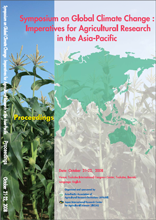A Strategic Look to the Future for Vegetable Research: The World Vegetable Center and Its Partners

Climatic change is expected to intensify the existing environmental stresses already plaguing the
productivity of vegetables and is expected to have a significant impact on food systems worldwide.
The developing countries in the tropics where the livelihoods of the majority are dependent on natural
resources and agricultural productivity will be particularly at risk.
Vegetables are an important source of vitamins, minerals, and micronutrients for the daily
dietary requirements of people worldwide. Among the Asian regions, Southeast Asia has the lowest
productivity (3.6 t/ha) (FAO, 2008). Vegetables grow less well under hot, humid lowland conditions.
Some of the factors affecting vegetable productivity are: high temperature, drought and limited water
resources, salinity, and pests and diseases. Plant injuries due to high temperatures generally result in
reduced productivity of crops grown in both tropical and temperate regions (Peet and Wolfe, 2000).
More than any other environmental stressor, water deficit is a seriously limiting factor (Saini and
Lalonde, 1998), while stress due to salinity constrains crop productivity by altering various cellular
processes in plants including ion displacement and solute concentration which affect the structure and
integrity of cell membranes (Cheikh, N. et al 2000),. Among the major crops AVRDC-The World
Vegetable Center is working on, tomatoes, cucumbers, pepper and eggplants are moderately sensitive
to salinity but onion is highly sensitive. Contamination of groundwater by highly saline irrigation
water in inland areas or through the intrusion of seawater in coastal areas due to natural disasters such
as tsunamis, can seriously affect soil fertility and render agricultural lands unproductive.
To develop climate-responsive vegetables AVRDC-The World Vegetable Center has broadened
its focus to include largely adaptation research on crop production systems to address the anticipated
impact and risk of climate change on vegetable productivity. In the last 25 years more than 100 heat
tolerant tomato lines have been distributed to different countries and representative varieties have been
released in 37 countries in the last 30 years. Using molecular markers, screening for heat and drought
tolerance could now be accelerated and superior alleles from wild species improving heat tolerance
can be efficiently identified and introgressed into breeding programs to develop not only high yielding
but also drought and heat tolerant cultivars. Production of sweet pepper in the lowland tropics is
possible only with heat-tolerant varieties. Heat tolerant test lines of sweet pepper have been identified
from evaluations conducted at AVRDC under high temperatures in recent years and are now being
distributed to cooperators in Africa and Southeast Asia. The hot pepper lines that are made available
for testing and evaluation to AVRDC cooperators worldwide were rated as either ‘good’, or ‘excellent’
for heat tolerance.
To address the problem of increased incidence of pests and diseases anticipated with climate
change, AVRDC conducts germplasm screening, evaluation and breeding for multiple resistance to the
large number of diseases plaguing vegetable crops. AVRDC has also long been involved in developing
technologies that address problems in vegetable production such as limited availability of irrigation
water, flooding, disease incidence, and absence of appropriate soil nutrients. Production strategies
include efficient use of irrigation water through drip irrigation; grafting to increase flood and disease
tolerance; use of mulches, shelters and raised beds help to conserve soil moisture, and to prevent soil
degradation, and to protect vegetables from heavy rains, high temperatures, and flooding; plus soil
amendments to improve soil fertility and enhance nutrient uptake of plants. Such technologies are
being improved further to become more efficient in addressing the potential impacts of climate
change.
Most exotic crops and modern varieties are sensitive to harsh environmental conditions but
many indigenous species are adapted to being grown under poor soil conditions. They can also often be more resistant to pests and diseases. Production and consumption of plant species used as food can
thus be diversified, not only to help sustain or improve health and nutrition among the poor in
developing countries, or generate income and sustain ecosystems, but also to ensure food security in
the face of climate change.
| Date of issued | |
|---|---|
| Creator | J. D. H. Keatinge D. Ledesma J. d’A. Hughes R. de la Pe?a |
| Subject |
climate change adaptation vegetable production risks stress tolerant crops rainshelters grafting |
| Publisher | Japan International Research Center for Agricultural Sciences |
| Available Online | |
| Issue | 2008 |
| spage | 113 |
| epage | 118 |
| Rights | Japan International Research Center for Agricultural Sciences |
| Language | eng |
